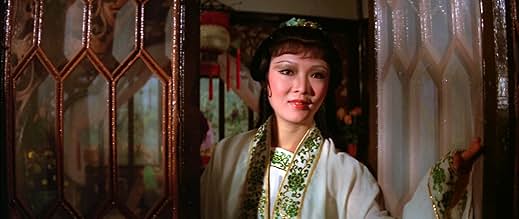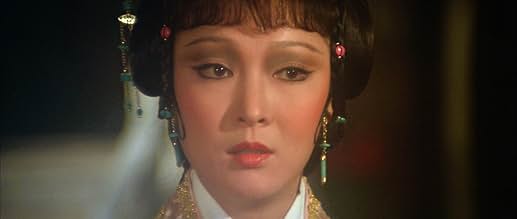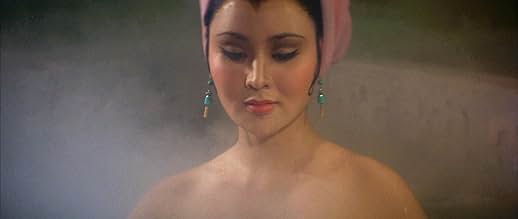IMDb RATING
6.6/10
1.2K
YOUR RATING
A psychotic craftsman pits two rival Kung-Fu masters against each other while designing special lanterns from a disturbing source.A psychotic craftsman pits two rival Kung-Fu masters against each other while designing special lanterns from a disturbing source.A psychotic craftsman pits two rival Kung-Fu masters against each other while designing special lanterns from a disturbing source.
Tony Liu
- Master Lung Shu Ai
- (as Liu Yung)
Chen Kuan-Tai
- Master Tan Fu
- (as Kuan Tai Chen)
Lo Lieh
- Chao Chun-Fang
- (as Lieh Lo)
Susan Yam-Yam Shaw
- Guest at Fu's Banquet
- (as Yin Yin Shaw)
Fung Ging-Man
- Guest at Fu's Banquet
- (as Ging-Man Fung)
- Director
- Writers
- All cast & crew
- Production, box office & more at IMDbPro
Featured reviews
Hammer horror meets wuxia. It makes about as much sense tonally as it sounds. Storywise, it's a barely coherent morality play about pride and greed that comes across like an excuse to string together some swordplay, some reasonably nasty flaying scenes, and very pretty setpieces. It is a great looking movie, I have to admit--the use of lighting is otherworldly. Sun Chung was easily one of the best directors Shaw Bros ever had, but when he wasn't doing cookie cutter martial arts stuff, he was seriously wasted on misguided crap (let's face it) like this.
There's something really "off" about how simultaneously Asian and European this movie feels. My instincts tell me it's not supposed to exist. Dramatically it never really takes off, but it's interesting enough in the context of "what were they thinking?" curio.
There's something really "off" about how simultaneously Asian and European this movie feels. My instincts tell me it's not supposed to exist. Dramatically it never really takes off, but it's interesting enough in the context of "what were they thinking?" curio.
In a quiet town nestled amidst mist-shrouded hills, two Kung-Fu masters vie for supremacy. Their battleground? Not the martial arts arena, but the eerie world of lantern craftsmanship. Directed by the enigmatic Chung Sun, Human Lanterns weaves a tale of obsession, betrayal, and gruesome artistry.
Master Lung (played by Tony Liu Yong) and Master Tan (Chen Kuan Tai) are town braggarts, each scheming to outshine the other. Tan unveils a human-sized lantern that captivates the simple folk, while Lung seeks an even grander creation. His quest leads him to Chun Fang (Lo Lieh), a former love rival turned master lantern maker. But Chun Fang's conditions are ominous: Lung must never visit his workshop.
The film's opening credits reveal a warehouse adorned with human remains atop a blood-soaked grinder. The macabre truth emerges: these gruesome trophies become the lanterns that illuminate the town. Skin peeled from victims' bodies, bones sculpted into delicate frames-the lanterns cast an otherworldly glow, fueled by suffering.
As more women vanish, the town trembles. The mysterious hermit hired by Tan adds to the intrigue. His lanterns, infused with secrets and darkness, lure unsuspecting souls. The brothel's madam, the prostitute, and the townsfolk-all are drawn into this dance of shadows and blades.
Human Lanterns teeters between horror and martial arts, its brutality tempered by censorship. The missing scenes-where skin meets blade-leave us craving the uncut version. Yet, the film's eerie ambiance and twisted creativity linger. It's a flawed gem, like a tarnished lantern casting both light and shadow.
Chung Sun's vision is a chiaroscuro nightmare, where beauty and horror entwine. Watch it for the unsettling visuals, the clash of egos, and the haunting lanterns. But beware: once you glimpse their glow, you'll forever question what lies beneath the surface.🌓 🔪🌟🌕🌺🔮🌓
Master Lung (played by Tony Liu Yong) and Master Tan (Chen Kuan Tai) are town braggarts, each scheming to outshine the other. Tan unveils a human-sized lantern that captivates the simple folk, while Lung seeks an even grander creation. His quest leads him to Chun Fang (Lo Lieh), a former love rival turned master lantern maker. But Chun Fang's conditions are ominous: Lung must never visit his workshop.
The film's opening credits reveal a warehouse adorned with human remains atop a blood-soaked grinder. The macabre truth emerges: these gruesome trophies become the lanterns that illuminate the town. Skin peeled from victims' bodies, bones sculpted into delicate frames-the lanterns cast an otherworldly glow, fueled by suffering.
As more women vanish, the town trembles. The mysterious hermit hired by Tan adds to the intrigue. His lanterns, infused with secrets and darkness, lure unsuspecting souls. The brothel's madam, the prostitute, and the townsfolk-all are drawn into this dance of shadows and blades.
Human Lanterns teeters between horror and martial arts, its brutality tempered by censorship. The missing scenes-where skin meets blade-leave us craving the uncut version. Yet, the film's eerie ambiance and twisted creativity linger. It's a flawed gem, like a tarnished lantern casting both light and shadow.
Chung Sun's vision is a chiaroscuro nightmare, where beauty and horror entwine. Watch it for the unsettling visuals, the clash of egos, and the haunting lanterns. But beware: once you glimpse their glow, you'll forever question what lies beneath the surface.🌓 🔪🌟🌕🌺🔮🌓
Do we have the nameless individual that tricks two others to fight each other? Does that sound like a famous western with Clint Eastwood? Which also was copied ... well let's not go down that road. Especially because while there may be parallels, there also quite a few differences here too.
I've seen my share of Shaw Brothers movies, but I can't remember seeing this one. This is quite out there, with a character being a mixture of monkey and demon, with the evil mindset of a ... human (a bad human that is of course). Add to that horror some good old fashioned stunts and flying lessons ... and voila you got yourself a movie that might not be everyones cup of tea (if you're easily offended, don't even bother, there are quite a few scenes that are far from political correct), but works for those who love these movies ... and if you're one of them, you won't mind certain flaws as much as others do
I've seen my share of Shaw Brothers movies, but I can't remember seeing this one. This is quite out there, with a character being a mixture of monkey and demon, with the evil mindset of a ... human (a bad human that is of course). Add to that horror some good old fashioned stunts and flying lessons ... and voila you got yourself a movie that might not be everyones cup of tea (if you're easily offended, don't even bother, there are quite a few scenes that are far from political correct), but works for those who love these movies ... and if you're one of them, you won't mind certain flaws as much as others do
The English title is in many respects, unfortunate, as this is really a morality play dressed as a martial arts film with horror elements.
The film begins by introducing us to "Master Tan" and "Master Lung," two wealthy, but otherwise uncharacterized, rivals. Master Tan displays a lantern that he had made for the lunar festival. Master Lung responds that it is an object unworthy of esteem. Lung then decides that he will hire a former rival, Chao Fang (played by Lieh Lo of "Five Fingers of Death" fame), to craft an even better lantern. Fang agrees, but only on condition that Lung never return to his lair-like shop.
Of importance to the story-line is the fact that Lung had, in the past, fought Fang, and scarred Fang's face. Lung, we are to note, is a man who believes his money can right all past wrongs.
From this "bargain" involving three men and their fragile "honor" come the horrors; for what this story is really about is Fang and his own place in the social order. The bargain gives him his own chance to avenge perceived wrongs, even as he crafts the handiwork that will allow Lung to one-up his competitor. From (relatively) small slights come disaster.
Of the story-line, I will say little else, as this is a movie that runs less on plot development than allowing a dynamic that has been set in motion early-on play itself out through a set of highly choreographed martial-arts routines. I will, however, comment on a few technical aspects that impressed me:
First, with the exception of a few sequences shot outdoors (one quite memorable, shot in a grove of tall trees), this is a studio-set movie that takes place in just a handful of locations. The sets are simply arresting and, in some cases, quite beautiful. The costumes, set design and lighting are all very-well thought out and executed. (Comparisons to the early films of Mario Bava are warranted.) None of the sets are meant to represent "actual" places, but rather allegorical places: the peaceful, noble abodes of Tan and Lung; the boisterous market-place; the hellishly menacing, creepy shop of Fang--each is set in opposition to its counter-parts.
So, in what time period does "HL" take place, exactly? As with much of the Wuxia genre, the historical setting is not terribly important for the story-line. What matters are the character-types. That said, the Hanfu styles of dress indicate one possible (and remote) time-period. The appearance of the tiger hooks (used by the assassin character) bring us much closer to the present.
Second, the lighting, camera work and editing are impressive. For example, the first time we meet the monkey-ghost character, the lighting frames the face in a way that was quite memorable for this viewer. Director Sun Chung also uses slow-motion and fast-motion techniques, particularly in the acrobatic martial-arts segments. But he also dabbles with soft focus shorts at times (mostly for the abodes of the two principal characters). There are many, many places where "HL" is a sumptuous, beautiful film (and one that deserved a better English title.)
If I have a quibble, it is that the end of the film does not do justice to the careful pacing and style of what preceded it. There are quite a few veteran actors at work here (though it is Lo who steals every scene in which he is a part); I just wish the ending could have been written better. That said, a surprisingly good movie. I was not expecting it, quite honestly.
The film begins by introducing us to "Master Tan" and "Master Lung," two wealthy, but otherwise uncharacterized, rivals. Master Tan displays a lantern that he had made for the lunar festival. Master Lung responds that it is an object unworthy of esteem. Lung then decides that he will hire a former rival, Chao Fang (played by Lieh Lo of "Five Fingers of Death" fame), to craft an even better lantern. Fang agrees, but only on condition that Lung never return to his lair-like shop.
Of importance to the story-line is the fact that Lung had, in the past, fought Fang, and scarred Fang's face. Lung, we are to note, is a man who believes his money can right all past wrongs.
From this "bargain" involving three men and their fragile "honor" come the horrors; for what this story is really about is Fang and his own place in the social order. The bargain gives him his own chance to avenge perceived wrongs, even as he crafts the handiwork that will allow Lung to one-up his competitor. From (relatively) small slights come disaster.
Of the story-line, I will say little else, as this is a movie that runs less on plot development than allowing a dynamic that has been set in motion early-on play itself out through a set of highly choreographed martial-arts routines. I will, however, comment on a few technical aspects that impressed me:
First, with the exception of a few sequences shot outdoors (one quite memorable, shot in a grove of tall trees), this is a studio-set movie that takes place in just a handful of locations. The sets are simply arresting and, in some cases, quite beautiful. The costumes, set design and lighting are all very-well thought out and executed. (Comparisons to the early films of Mario Bava are warranted.) None of the sets are meant to represent "actual" places, but rather allegorical places: the peaceful, noble abodes of Tan and Lung; the boisterous market-place; the hellishly menacing, creepy shop of Fang--each is set in opposition to its counter-parts.
So, in what time period does "HL" take place, exactly? As with much of the Wuxia genre, the historical setting is not terribly important for the story-line. What matters are the character-types. That said, the Hanfu styles of dress indicate one possible (and remote) time-period. The appearance of the tiger hooks (used by the assassin character) bring us much closer to the present.
Second, the lighting, camera work and editing are impressive. For example, the first time we meet the monkey-ghost character, the lighting frames the face in a way that was quite memorable for this viewer. Director Sun Chung also uses slow-motion and fast-motion techniques, particularly in the acrobatic martial-arts segments. But he also dabbles with soft focus shorts at times (mostly for the abodes of the two principal characters). There are many, many places where "HL" is a sumptuous, beautiful film (and one that deserved a better English title.)
If I have a quibble, it is that the end of the film does not do justice to the careful pacing and style of what preceded it. There are quite a few veteran actors at work here (though it is Lo who steals every scene in which he is a part); I just wish the ending could have been written better. That said, a surprisingly good movie. I was not expecting it, quite honestly.
Human Lanterns goes for broke and mostly works. It's gonzo stuff, being a cross between a martial arts movie and a murder-mystery about a deranged serial killer, all taking place hundreds of years ago (possibly longer).
I like it when a Shaw Brothers movie does something out of left field. This isn't my favorite example of the studio doing that, but it certainly has its moments - enough of them for this to end up being pretty decent. There's enough here that's fun to make it worth a watch for martial arts fans after something different.
It was let down a little, I felt, by being uneven. It committed to different levels of crazy at different points, and feels all-over-the-place as a result. That sense of chaos can work when it's pushed far enough often enough in a movie like this, but I don't feel like Human Lanterns always did the best job at this.
Still, for having some silly horror mixed in with some violent fight scenes, there was a good amount here that proved enjoyable. The kind of thing that gets a caution recommendation, for fans of this style of odd film, at least.
I like it when a Shaw Brothers movie does something out of left field. This isn't my favorite example of the studio doing that, but it certainly has its moments - enough of them for this to end up being pretty decent. There's enough here that's fun to make it worth a watch for martial arts fans after something different.
It was let down a little, I felt, by being uneven. It committed to different levels of crazy at different points, and feels all-over-the-place as a result. That sense of chaos can work when it's pushed far enough often enough in a movie like this, but I don't feel like Human Lanterns always did the best job at this.
Still, for having some silly horror mixed in with some violent fight scenes, there was a good amount here that proved enjoyable. The kind of thing that gets a caution recommendation, for fans of this style of odd film, at least.
Details
- Release date
- Country of origin
- Language
- Also known as
- Human Lanterns
- Production company
- See more company credits at IMDbPro
Contribute to this page
Suggest an edit or add missing content



































